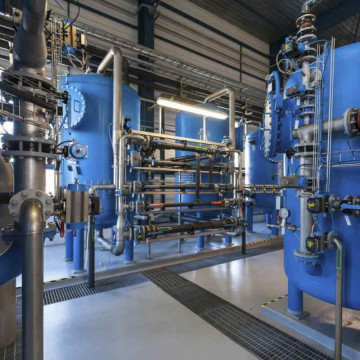
Image Source – Google
In today's world, water scarcity and pollution have become pressing issues that require innovative solutions. One such solution is the use of ion exchange resins for sustainable water purification. This technology offers an efficient and environmentally friendly way to treat water and remove contaminants, making it safe for consumption and other uses.
If you are looking for Ion Exchange Resins services then you may browse this website. In this article, we will explore the benefits and applications of ion exchange resins in water purification.
The Basics of Ion Exchange Resins
Ion exchange resins are polymers that are capable of exchanging ions with surrounding solutions. These resins contain functional groups that can attract and exchange ions in water. When contaminated water passes through a bed of ion exchange resins, the resins selectively remove harmful ions and replace them with less harmful or desirable ones.
How Ion Exchange Resins Work
- Ion exchange resins work on the principle of electrostatic attraction.
- When water containing ions flows through the resin bed, the functional groups on the resin attract and hold onto the ions.
- As a result, the harmful ions are removed from the water, leaving it clean and safe for use.
Types of Ion Exchange Resins
There are different types of ion exchange resins available, each designed for specific water treatment applications:
- Cation Exchange Resins: These resins exchange positively charged ions, such as calcium, magnesium, and heavy metals.
- Anion Exchange Resins: These resins exchange negatively charged ions, such as nitrates, sulfates, and organic acids.
- Mixed Bed Resins: These resins contain both cation and anion exchange resins mixed together to provide more comprehensive water purification.
Benefits of Ion Exchange Resins in Water Purification
Utilizing ion exchange resins for water purification offers several advantages over traditional methods:
Effective Contaminant Removal
- Ion exchange resins can effectively remove a wide range of contaminants, including heavy metals, nitrates, sulfates, and organic compounds.
- They are particularly useful in treating hard water by removing calcium and magnesium ions that cause scaling and soap scum buildup.
Regeneration and Reuse
- Ion exchange resins can be regenerated by washing them with brine or acid solutions to restore their ion exchange capacity.
- This allows for the resins to be reused multiple times, making them a cost-effective and sustainable water treatment solution.
Customizable for Specific Applications
- Ion exchange resins can be tailored to specific water treatment needs by selecting resins with the appropriate functional groups and pore sizes.
- This customization ensures efficient removal of target contaminants and optimal water quality.
Applications of Ion Exchange Resins
Ion exchange resins have a wide range of applications in water purification and other industries:
Industrial Water Treatment
- Ion exchange resins are used in industries such as pharmaceuticals, power generation, and food and beverage production to treat process water and remove impurities.
- They help maintain water quality standards and ensure compliance with environmental regulations.
Drinking Water Treatment
- Municipal water treatment plants use ion exchange resins to soften water, remove heavy metals, and reduce the presence of harmful contaminants.
- These resins play a critical role in providing safe and clean drinking water to communities.
Wastewater Treatment
- Ion exchange resins are employed in wastewater treatment systems to remove pollutants and improve water quality before discharge into the environment.
- They help minimize the environmental impact of industrial and municipal wastewater discharges.
Conclusion
Ion exchange resins offer a sustainable and effective solution for water purification, addressing the growing challenges of water scarcity and pollution. By leveraging the unique properties of ion exchange resins, industries can achieve clean water standards and protect the environment for future generations. With ongoing advancements in resin technology, the potential for ion exchange resins to revolutionize water treatment practices is significant.